Mikhail Gorbachev, 1931-2022
The last Soviet leader is gone at 91.

New York Times, “Mikhail S. Gorbachev, Reformist Soviet Leader, Is Dead at 91“
Mikhail S. Gorbachev, whose rise to power in the Soviet Union set in motion a series of revolutionary changes that transformed the map of Europe and ended the Cold War that had threatened the world with nuclear annihilation, has died in Moscow. He was 91.
His death was announced on Tuesday by Russia’s state news agencies, citing the city’s central clinical hospital. The reports said he had died after an unspecified “long and grave illness.”
Few leaders in the 20th century, indeed in any century, have had such a profound effect on their time. In little more than six tumultuous years, Mr. Gorbachev lifted the Iron Curtain, decisively altering the political climate of the world.
At home he promised and delivered greater openness as he set out to restructure his country’s society and faltering economy. It was not his intention to liquidate the Soviet empire, but within five years of coming to power he had presided over the dissolution of the Union of Soviet Socialist Republics. He ended the Soviet debacle in Afghanistan and, in an extraordinary five months in 1989, stood by as the Communist system imploded from the Baltics to the Balkans in countries already weakened by widespread corruption and moribund economies.
For this he was hounded from office by hard-line Communist plotters and disappointed liberals alike, the first group fearing that he would destroy the old system and the other worried that he would not.
It was abroad that he was hailed as heroic. To George F. Kennan, the distinguished American diplomat and Sovietologist, Mr. Gorbachev was “a miracle,” a man who saw the world as it was, unblinkered by Soviet ideology.
But to many inside Russia, the upheaval Mr. Gorbachev had wrought was a disaster. President Vladimir V. Putin called the collapse of the Soviet Union the “greatest geopolitical catastrophe of the century.” For Mr. Putin — and his fellow K.G.B. veterans who now form the inner circle of power in Russia — the end of the U.S.S.R. was a moment of shame and defeat that the invasion of Ukraine this year was meant to help undo.
Washington Post, “Mikhail Gorbachev, last leader of the Soviet Union, dies at 91“
Mikhail Gorbachev, the last leader of the Soviet Union, who embarked on a path of radical reform that brought about the end of the Cold War, reversed the direction of the nuclear arms race and relaxed Communist Party controls in hopes of rescuing the faltering Soviet state but instead propelled it toward collapse, died Aug. 30 in Moscow. He was 91.
His death was announced by Russian news agencies, citing the government hospital where he was being treated, but no further details were immediately available.
For the sheer improbability of his actions and their impact on the late 20th century, Mr. Gorbachev ranks as a towering figure. In 1985, he was chosen to lead a country mired in socialism and stultifying ideology. In six years of cajoling, improvised tactics and increasingly bold risks, Mr. Gorbachev unleashed immense changes that eventually demolished the pillars of the state.
The Soviet collapse was not Mr. Gorbachev’s goal, but it may be his greatest legacy. It brought to an end a seven-decade experiment born of Utopian idealism that led to some of the bloodiest human suffering of the century. A costly global confrontation between East and West abruptly ceased to exist. The division of Europe fell away. The tense superpower hair-trigger nuclear standoff was eased, short of Armageddon.
None of it could have happened but for Mr. Gorbachev. Along the way, he let loose a revolution from above within the Soviet Union, prodding and pushing a stagnant country in hopes of reviving it. In nearly six years of high drama and breathtaking transformation, Mr. Gorbachev pursued ever-larger ambitions for liberalization, battling inertia and a stubborn old guard.
Wall Street Journal, “Mikhail Gorbachev, Reformer of Soviet Union and Its Last Leader, Dies at 91“
As the eighth and final leader of the Soviet Union, Mikhail Gorbachev sought to reform the Communist state and infuse greater transparency. But his efforts unleashed a wave of unstoppable forces that led to the nation’s demise, reshaping the geopolitical landscape and leaving the U.S. as the world’s sole superpower.
Russia’s state news agencies cited Moscow’s central clinical hospital as saying he had died aged 91. A representative for Mr. Gorbachev confirmed his death.
The son of peasants, the world would come to know him as the architect of “perestroika” and “glasnost”—restructuring and openness—domestic policies he hoped would breathe new life into the country’s sluggish 1980s economy, remake the political system and loosen some civil restrictions at a time of warming relations with the West.
What happened next was the unraveling of decades-old entrenched Communist regimes across the Eastern bloc, the reunification of Germany’s East and West, and greatly improved ties with the U.S.
“I do not relieve myself of responsibility for the initiated reforms, because I am still deeply convinced that they were vital and ultimately will serve the well-being of my Motherland and will be beneficial for the world,” Mr. Gorbachev wrote in a two-volume book called “Life and Reforms,” published in 1995.
Mr. Gorbachev’s rejection of force to crush the push for freedom in the Soviet bloc, the easing of censorship in the media and cultural life, and his support of a landmark nuclear-arms-control agreement with the U.S. won him much praise abroad, and he was awarded the 1990 Nobel Peace Prize.
The Nobel committee cited “his leading role in the peace process,” which it said “characterized important parts of the international community” at that time.
“These were the acts of a rare leader—one with the imagination to see that a different future was possible and the courage to risk his entire career to achieve it. The result was a safer world and greater freedom for millions of people,” U.S. President Joe Biden said in a statement.
But such warm sentiments weren’t felt at home, where many blamed the Soviet leader for the poverty and economic hardship that came with his loosening of centralized control of some businesses and in agriculture and manufacturing, for allowing the rise of nationalism in former Soviet republics, and for the loss of the U.S.S.R.’s status as a superpower.
“The real problem is, he was trying to introduce freedom of society for a population that did not know how to use freedom,” said Moscow-based political scientist Mark Urnov, who worked at Mr. Gorbachev’s foundation. “For many generations, we were under a very tough totalitarian regime. We were deprived of any elementary personal freedom. To overcome such kind of a legacy, three or four generations are needed.”
Associated Press, “Mikhail Gorbachev, who steered Soviet breakup, dead at 91“
Mikhail Gorbachev, who set out to revitalize the Soviet Union but ended up unleashing forces that led to the collapse of communism, the breakup of the state and the end of the Cold War, died Tuesday. The last Soviet leader was 91.
Gorbachev died after a long illness, according to a statement issued by the Central Clinical Hospital in Moscow. No other details were given.
Though in power less than seven years, Gorbachev unleashed a breathtaking series of changes. But they quickly overtook him and resulted in the collapse of the authoritarian Soviet state, the freeing of Eastern European nations from Russian domination and the end of decades of East-West nuclear confrontation.
U.S. President Joe Biden called Gorbachev a “man of remarkable vision” and a “rare leader” who had “the imagination to see that a different future was possible and the courage to risk his entire career to achieve it.
“The result was a safer world and greater freedom for millions of people,” Biden said in a statement.
“Hard to think of a single person who altered the course of history more in a positive direction” than Gorbachev, said Michael McFaul, a political analyst and former U.S. ambassador in Moscow, on Twitter. “Gorbachev was an idealist who believed in the power of ideas and individuals. We should learn from his legacy.”
Gorbachev’s decline was humiliating. His power hopelessly sapped by an attempted coup against him in August 1991, he spent his last months in office watching republic after republic declare independence until he resigned on Dec. 25, 1991. The Soviet Union wrote itself into oblivion a day later.
A quarter-century after the collapse, Gorbachev told The Associated Press that he had not considered using widespread force to try to keep the USSR together because he feared chaos in the nuclear country.
“The country was loaded to the brim with weapons. And it would have immediately pushed the country into a civil war,” he said.
Many of the changes, including the Soviet breakup, bore no resemblance to the transformation that Gorbachev had envisioned when he became Soviet leader in March 1985.
By the end of his rule, he was powerless to halt the whirlwind he had started. Yet Gorbachev may have had a greater impact on the second half of the 20th century than any other political figure.
Gorbachev was, no doubt, a world-historical figure. Most of the obits, though, give him too much credit for what was, after all, a catastrophic failure of his plan to save the Soviet Union and the Communist Party.
It’s very much true that, after several failed caretakers who followed Leonid Brezhnev as premier, Gorbachev was a visionary. He understood, better than American analysts, that the USSR was a Potemkin superpower with a fragile economy and a stultified political and social structure that simply could not compete in anything but a military sense—and was suddenly losing on that front as well, thanks to Jimmy Carter’s Offset Strategy and Ronald Reagan’s massive spending that made it possible.
Glasnost and perestroika became household words thanks to him. But, while it was naturally seen by Western eyes as modernization and liberalization for their own sake was, as Gorbachev always acknowledged, a desperate attempt to pump life into a sclerotic system. Similarly, while he won a Nobel Peace Prize for his role in the liberation of Eastern and Central Europe in the aftermath of the Cold War, his only contribution was not trying to save the regime and the empire through traditional Soviet thuggery.

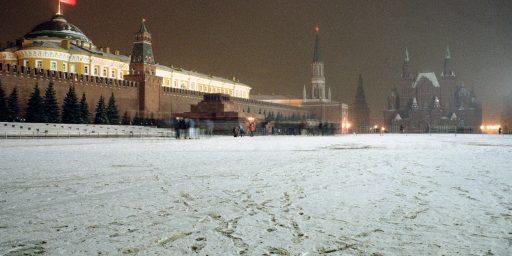
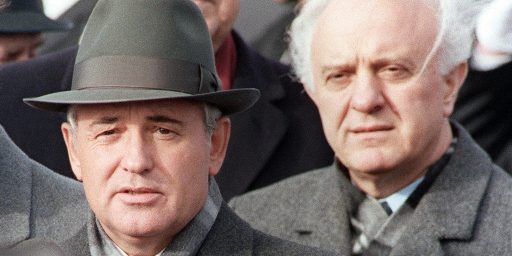
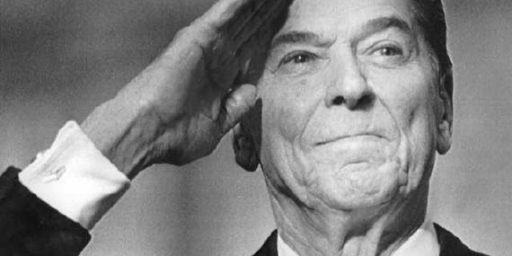
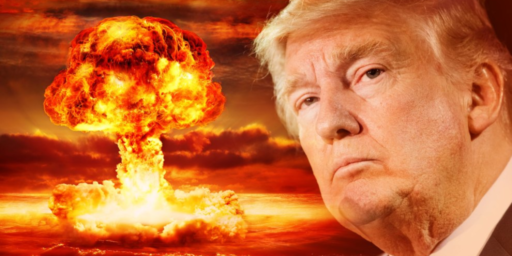
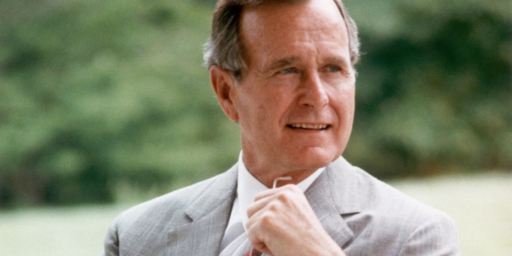
If you liberalize opinion and expression, and the prevalent sentiment is “We want OUT of the USSR!” then the collapse was inevitable.
On the other hand, China managed to reform its economic base without political liberties. All in all, it’s a good thing Gorbachev didn’t take up the Chinese approach. Imagine a wealthier hegemonic USSR.
There’s also the matter of Nikita Kruschev. He also engaged in liberalization and reform, a period known as the Thaw. There was no collapse then, but it proved Kruschev’s downfall. His policies were later reversed amid much repression under Brezhnev.
It figures by the time of Gorbachev the people knew what to do with their freedom.
“…in the aftermath of the Cold War, his only contribution was not trying to save the regime and the empire through traditional Soviet thuggery.”
And there’s a problem with that? Seems like a worthwhile effort to me. He blazed a different trail for other Russian leaders to follow, even if he didn’t get to the end of his own particular journey.
May he rest in a well-earned peace.
We were all told that the USSR was a very powerful cohesive entity. The power of communism was so great that any Marxist in any nation on earth had to be opposed by any means lest that nation turned into a vassal state bowing to the Kremlin. I don’t recall any prominent thinker in 1980 saying that the empire was on the verge of collapse. In 1985 we thought the USSR would last forever. In 1985 all responsible people thought the Chernobyl reactors were stable. Maybe the USSR was flawed and just plain fragile, ready for catastrophic failure just like the Chernobyl number 4 reactor. Gorbachev was trying to do the impossible; we should give him credit for managing the unwinding of the USSR without unrest and bloodshed.
Some former Soviet inhabitants are rather lesser charitable to Gorbachev.
And the Caucasus, arguably starting the process that led to the Chechnya Wars.
Though, at least in the Baltics, he did not back the full-on military occupation some military commanders wanted, he did approve the crackdowns on pro-independence movements which led to quite a few deaths.
Repression that only stopped when the failed coup led to the collapse of the Soviet Union and the fall of Gorbachev.
Gorbachev certainly wanted peace with the West, and was not prepared for the cost in blood and money of supporting the Communist regimes in Eastern Europe.
But he was at times quite prepared to use force to keep the Soviet Union intact.
He also failed (though a lot of this was down to the obstruction of Ligachev and others) to avoid state industries becoming prey to various coalitions of managers, Party overseers, and black marketeers: the road to the mafiya/oligarch/siloviki political economy.
Though in fairness, it was Yeltsin and Kravchuk who then failed to take any action to avoid that course, when full-on privatisation was enacted.
@Slugger:
Arguable he managed the ending of the Soviet imperium in Eastern Europe without bloodshed.
But not the USSR itself.
His fall and that of the USSR itself were interlinked.
It was only after the coup attempt of August 1991, that Gorbachev was bypassed, by Yeltsin, Kravchuk, and Shushkevich.
When they effectively asserted the independence of Russia, Ukraine and Belarus, the USSR came to an end, and Gorbachev faded into powerlessness, President of a state that had vanished beneath him.
I was in Moscow when the coup happened during a summer exchange program. Most of our teachers manned the barricades around the white house at night and then taught us during the day. We weren’t allowed to leave the campus until it was almost over, but we did go down and look at everything and talk to people. It was pretty inspiring. I ended up giving most of the Marlboros I’d brought to the country as trade goods to some of the soldiers who were defending Yeltsin. Exciting times!
@Kathy: Like Krushchev, Gorbachev will get the last laugh. He won’t be buried outside the Kremlin wall, but will have a tree-shaded place in Novodevechiy Cemeter (which is also where K rests). I’ve visited it, and it’s a very peaceful spot.
@SC_Birdflyte: I was wondering where he would be buried, as it seems to be a indicator of…something…in Russia. Although I understand where one rests in and about the Kremlin can change. Thank you.
@Skookum: You might search online for photos. It’s a very historic boneyard, next to a monastery founded by one of Peter the Great’s discarded wives.